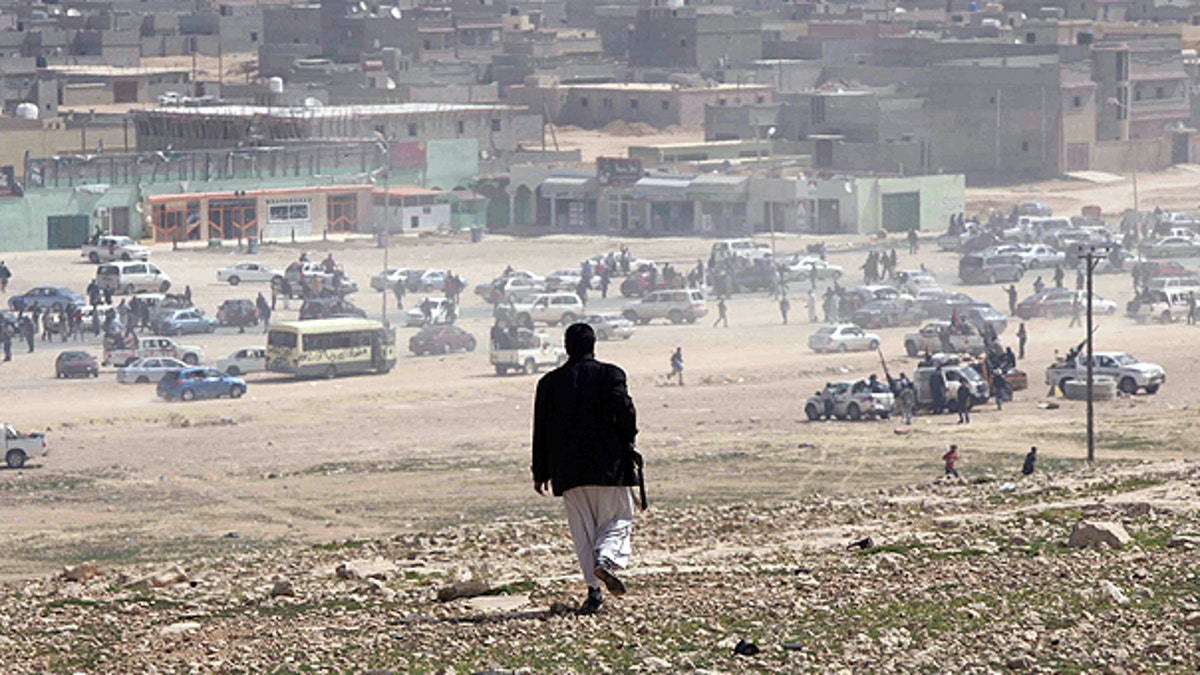
March 29: A Libyan rebel stands overlooking an area where rebels gathered following clashes with pro-Qaddafi forces in Ras Lanouf, Libya. (AP)
The Pentagon is planning how it might arm Libyan rebels, but questions of legality have prevented the Obama administration from putting the plan into motion, a senior military official tells Fox News.
Although the legal framework exists within the United Nations resolution to arm rebels, the question is whether or not this rebel group falls into that legal framework.
"It's a question of the group's legitimacy," the official told Fox News.
Prime Minister David Cameron said Britain believes a legal loophole could allow nations to supply weapons to Libya's rebels -- but stressed the U.K. has not decided whether it will offer assistance to the rebels.
U.S. Secretary of State Hillary Rodham Clinton said Tuesday that Washington also believes it would be legal to give the rebels weapons. As to whether the country would do so, President Barack Obama told NBC, "I'm not ruling it out, but I'm also not ruling it in."
France, one of the strongest backers of international intervention in Libya, believes arming rebels would require a new U.N. resolution; the existing one includes an arms embargo. But Foreign Minister Alain Juppe said, "We are ready to discuss it with our partners."
Under the U.N. resolution authorizing necessary measures to protect civilians, nations supplying weapons would need to be satisfied they would be used only to defend civilians -- not to take the offensive to Qaddafi's forces.
Cameron's spokesman Steve Field said British and other diplomats were involved in negotiations with the rebel leadership in Benghazi partly to gauge if the opposition would be trustworthy allies.
"We are in the process of talking to those people and learning more about their intentions," Field told reporters.
This comes as forces loyal to Libyan leader Muammar al-Qaddafi continue to strike back against rebels Wednesday as 18 civilians were reportedly killed in fighting in Misrata, a rebel spokesman told Reuters.
The rebel spokesman also said that tanks are firing shells into the opposition-held town.
Rebels retreated from the key Libyan oil port of Ras Lanouf along the coastal road leading to the capital Tripoli after they came under heavy shelling from Qaddafi ground forces.
Qaddafi's forces were shelling Brega, another important oil city to the east. A rebel soldier, Col. Abdullah Hadi, said he expected the loyalists to enter Brega by Wednesday night.
"I ask NATO for just one aircraft to push them back. All we need is air cover and we could do this. They should be helping us," Hadi said.
NATO planes flew over the zone where the heaviest fighting was under way earlier Wednesday and an Associated Press reporter at the scene heard explosions, but it was unclear whether any airstrikes hit the area. U.S. Marine Corps Capt. Clint Gebke, a spokesman for the NATO operation aboard the USS Mount Whitney, said he could not confirm any specific strikes but Western aircraft were engaging pro-Qaddafi forces in areas including Sirte and Misrata, the rebels' last significant holdout in western Libya.
The retreat Wednesday looked like a mad scramble: Pickup trucks, with mattresses and boxes tied on, driving east at 100 mph (160 kilometers per hour).
Many rebels regrouped east of Brega at the green, arching western gate of Ajdabiya, sharing water, dates and tuna sandwiches on a sandy, windswept plain next to two burned-out tanks and two burned-out cars from the airstrikes last week that drove Qaddafi's forces back. Three anti-aircraft guns mounted in back of pickup trucks pointed west down the road.
"There's something strange about the way he attacked us today," said Abdullah Abdel-Jalil, a 31-year-old ambulance driver. "The Grad rockets, the tanks, the quantity of it all, he's stronger than we thought. It's way too intense."
Dozens of civilians were seen heading north to Benghazi, and streets on the western side of Ajdabiya were deserted and silent. Among the rebels, the lack of air support was a common lament.
"We don't know why they're not here," said Moftah Mohammed, a 36-year-old rebel soldier. "Our forces are mainly on the side of the main road. We've heard Qaddafi's forces are pushing deep into the desert" in an attempt to head off rebel forces. "We don't want to be stuck in the middle of that."
Mohammed, however, thought loyalist forces would stop pursuing the rebels. "Qaddafi aims to take back Ras Lanouf and Brega because he's running out of oil. I think he'll stop there," he said.
As Qaddafi's forces push rebels toward their de-facto capital Benghazi, some 140 miles northeast of Brega, pressure is growing for NATO members and other supporters of the air campaign to do more.
The Associated Press contributed to this report.
